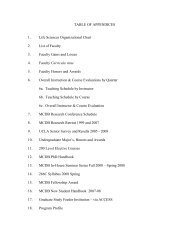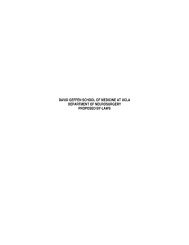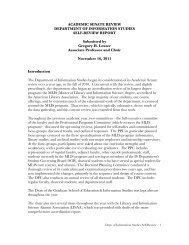- Page 1 and 2:
UNIVERSITY OF CALIFORNIA LOS ANGELE
- Page 3 and 4:
I. IntroductionThis review comes at
- Page 5 and 6:
ange of applicants, as well as expa
- Page 7 and 8:
a formal mentoring program, which i
- Page 9 and 10:
Intramural Grants Awarded from 2004
- Page 11 and 12:
Patient Care Technology; Essential
- Page 13 and 14:
community-based practice for RNs wh
- Page 15 and 16:
advanced practice nurses, and educa
- Page 17 and 18:
coordinated each year by the respon
- Page 19 and 20:
equiring a certain number of TA exp
- Page 21 and 22:
The amount of need-based scholarshi
- Page 23 and 24:
and/ or education based on evaluati
- Page 25 and 26:
Appendices XIAPPENDIX ASchedule of
- Page 27:
APPENDIX B: UCLA SON ANNOUNCEMENT27
- Page 75 and 76:
APPENDIX CAdministrative Staff List
- Page 77 and 78:
Appendix D: Student Enrollment. Att
- Page 79 and 80:
Appendix E: Faculty Listing and Fac
- Page 81 and 82:
Gawlinski, Anna 20.00 4-405230-1A-6
- Page 83 and 84:
APPENDIX F UCLA SON BY-LAWSUCLA SCH
- Page 85 and 86:
(iii)Chairs of the following Standi
- Page 87 and 88:
14. Standing Committees of the Facu
- Page 89 and 90:
4) Meetingsi) One (1) Professor and
- Page 91 and 92:
(d)The Chair shall be elected from
- Page 93 and 94:
ecruitment, progression and retenti
- Page 95 and 96:
Appendix G: Endowed Chair List95
- Page 97 and 98:
APPENDIX H: FACULTY TEACING HONORS
- Page 99 and 100:
Appendix I: Faculty Certifications
- Page 101 and 102:
Keenan, ColleenCertified FamilyNurs
- Page 103 and 104:
Appendix J: Faculty Accomplishments
- Page 105 and 106:
J2. Faculty & Administrator members
- Page 107 and 108:
of the Honorary Doctorate and Creat
- Page 109 and 110:
contributions by Assemblyman Joel A
- Page 111 and 112:
populations, a handbook for Practit
- Page 113 and 114:
Springer, Chapter 13, 157-1763113
- Page 115 and 116:
J6. Editorial Boards from 2005-2008
- Page 117 and 118:
J7. Journal Articles Published from
- Page 119 and 120:
2007; 69 (1): 10-6.Sheahan SL, Raye
- Page 121 and 122:
Fongwa, Marie Jan Shoultz, Marie Fo
- Page 123 and 124:
Varpetian A., Medina L.D., Cummings
- Page 125 and 126:
Koniak-Griffin, D., & Stein, J. A.
- Page 127 and 128:
Research 2005; 57: 1-9.Woo MA, Mace
- Page 129 and 130:
Maliski SL, Kwan L, Litwin MS (in p
- Page 131 and 132:
Child Health. Epub Ahead of Print P
- Page 133 and 134:
Xing X, Wu G, Wei F, Liu P, Wei H,
- Page 135 and 136:
Sun, V, Sarna L, Wagman, L D (2008)
- Page 137 and 138: obstructive sleep apnea. Respir Phy
- Page 139 and 140: J8. Participation on Community Boar
- Page 141 and 142: Chemical DependencyMember, Task For
- Page 143 and 144: AureliaHarbor-UCLA and Olive View-U
- Page 145 and 146: Wiley, DorothyWoods, LynnWright, Ky
- Page 147 and 148: APPENDIX K: PRE-LICENSURE HANDBOOK
- Page 149 and 150: PERSONAL APPEARANCE................
- Page 151 and 152: PurposeThe purpose of the pre-licen
- Page 153 and 154: facilitate learning. Individual aca
- Page 155 and 156: 5. Participate in professional and
- Page 157 and 158: B.S. Generic/Pre-licensure (BS-G) G
- Page 159 and 160: 8. A student who receives a grade o
- Page 161 and 162: MECN Program Curriculum PlanMECN Sa
- Page 163 and 164: MECN Progression1. Progression with
- Page 165 and 166: Assessment ExaminationsPurposeThe A
- Page 167 and 168: MECN Written Comprehensive Examinat
- Page 169 and 170: Expectations for BehaviorThe nursin
- Page 171 and 172: Commitment to LearningThe UCLA nurs
- Page 173 and 174: Clinical EducationCampus Skills Lab
- Page 175 and 176: 9. Both the supporting theory and r
- Page 177 and 178: 3. Annual tuberculosis screening by
- Page 179 and 180: Personal AppearanceHYGIENE:1. Good
- Page 181 and 182: Clinical Agency RulesStudents are e
- Page 183 and 184: School of Nursing: Fitness-for-Clin
- Page 185 and 186: Health Situations Increasing Risk i
- Page 187: 3. UCLA School of Nursing allows pe
- Page 191 and 192: Student - Faculty CommunicationStud
- Page 193 and 194: 9. If a student receives an incompl
- Page 195 and 196: To assist students with the financi
- Page 197 and 198: Office for Students with Disabiliti
- Page 199 and 200: Escort ServicesPlease call (310) 79
- Page 201 and 202: epresented at the School of Nursing
- Page 203 and 204: Undergraduate Program CommitteeThis
- Page 205 and 206: A signature page at the end of the
- Page 207 and 208: APPENDIX P: SEQUENCE OF Ph.D. CURRI
- Page 209 and 210: Total12-18Total14-16Total12-16THIRD
- Page 211 and 212: APPENDIX M: LISTING OF PH.D. STUDEN
- Page 213 and 214: Appendix N: UCLA SON Strategic Plan
- Page 215 and 216: professional nursing practice. New
- Page 217 and 218: priority for strategic plans in dev
- Page 219 and 220: encryption in November 2005, to pro
- Page 221 and 222: Assistant for FundManagementSenior
- Page 223 and 224: ACADEMIC STRATEGIC PLANGoal 1:Enhan
- Page 225 and 226: Strategies to Accomplish the Goal:1
- Page 227 and 228: Time Line for Strategies:1) Finaliz
- Page 229 and 230: skills. Currently Palliative Care,
- Page 231 and 232: the Undergraduate and Graduate Prog
- Page 233 and 234: Enhanced skills lab, complete with
- Page 235 and 236: 7) Resources and Cost: We would hav
- Page 237 and 238: A. Recruitment policies1) Objective
- Page 239 and 240:
f) To encourage the employment of c
- Page 241 and 242:
Current status: this would be a com
- Page 243 and 244:
MARIE COWANDEANUCLA SCHOOL OF NURSI
- Page 245 and 246:
CAMPAIGN REPORT$2,500,000$2,000,000
- Page 247 and 248:
II. Diversify Fundraising In Order
- Page 249 and 250:
e) Strategy #5: Working with the UC
- Page 251 and 252:
alumni) each group will receive a p
- Page 253 and 254:
staying connected to the school. En
- Page 255 and 256:
RESEARCH STRATEGIC PLANCritical to
- Page 257 and 258:
post award research within the Scho
- Page 259 and 260:
day-to-day issues of the Center. Th
- Page 261 and 262:
ACADEMIC COMMITTEES STRATEGIC PLANC
- Page 263 and 264:
egular committee load. However, thi
- Page 265 and 266:
Additionally, it is highly recommen
- Page 267 and 268:
Addendum ISummary Table of Issues a
- Page 269 and 270:
Dr. Daniels has a unique approach t
- Page 271 and 272:
Benefits:Increased faculty retentio
- Page 273 and 274:
Benefits:Increased faculty and stud
- Page 275 and 276:
6) Implement management evaluation
- Page 277 and 278:
2) Information Security. A critical
- Page 279 and 280:
2) Subject all new program and syst
- Page 281 and 282:
These systems provide a core of sec
- Page 283 and 284:
Recommendations:At this time the on
- Page 285 and 286:
(but not indefinite) period. This p
- Page 287 and 288:
Evaluation Methodology:Evaluation o
- Page 289 and 290:
a) 10 rooms with ceiling installed
- Page 291 and 292:
esolved. Current campus pilots of t
- Page 293 and 294:
Program DescriptionUCLA School of N
- Page 295 and 296:
sections per course. The justificat
- Page 297 and 298:
Revenue. The calculation for the re
- Page 299 and 300:
Appendix O: Baccalaureate Critical
- Page 301 and 302:
Appendix P: Masters of Science Achi
- Page 303 and 304:
Table 1: Question 8 “I apply theo
- Page 305 and 306:
Question 21Percentage90807060504030
- Page 307 and 308:
Question 25Percentage90807060504030
- Page 309 and 310:
Question 32Percentage80706050403020
- Page 311 and 312:
Question 34Percentage80706050403020
- Page 313 and 314:
Question 8Percentage908070605040302
- Page 315 and 316:
Question 21Percentage90807060504030
- Page 317 and 318:
Question 25Percentage90807060504030
- Page 319 and 320:
Question 32Percentage80706050403020
- Page 321 and 322:
Question 34Percentage80706050403020
- Page 323 and 324:
APPENDIX Q: EDUCATION BENCHMARKING
- Page 325 and 326:
Where has satisfaction improved/dec
- Page 327 and 328:
•Learning Outcomes from Didactic/
- Page 329 and 330:
mAdministration and Academic Advisi
- Page 331 and 332:
gQuality of Support ServicesLearnin
- Page 333 and 334:
Population: University of Californi
- Page 335 and 336:
oPopulations•Q058. To what degree
- Page 337 and 338:
•Q052. Learning Outcomes - To wha
- Page 339 and 340:
Questions for AACN MS - The Essenti
- Page 341 and 342:
Questions for AACN MS - The Essenti
- Page 343 and 344:
Q107. Clinical epidemiological prin
- Page 345 and 346:
oPopulations•Q082. Acute and chro
- Page 347 and 348:
Performing proceduresoPopulations
- Page 349 and 350:
Questions for AACN MS - The Essenti
- Page 351 and 352:
= Your institution is within .25 of
- Page 353 and 354:
Variable 2004 (n=13) 2006 (n=9) p-v
- Page 355 and 356:
355
- Page 357 and 358:
Academic Senate Executive OfficeLos
- Page 359 and 360:
359
- Page 361 and 362:
361
- Page 363 and 364:
363
- Page 365 and 366:
365
- Page 367 and 368:
367
- Page 369 and 370:
369
- Page 371 and 372:
371
- Page 373 and 374:
373
- Page 375 and 376:
375
- Page 377 and 378:
377
- Page 379 and 380:
379
- Page 381 and 382:
381
- Page 383 and 384:
383
- Page 385 and 386:
385
- Page 387 and 388:
387
- Page 389 and 390:
389
- Page 391 and 392:
391
- Page 393 and 394:
393
- Page 395 and 396:
395
- Page 397 and 398:
397
- Page 399 and 400:
399
- Page 401 and 402:
401
- Page 403 and 404:
403
- Page 405 and 406:
405
- Page 407 and 408:
407
- Page 409 and 410:
409
- Page 411 and 412:
411
- Page 413 and 414:
413
- Page 415 and 416:
415
- Page 417 and 418:
417
- Page 419 and 420:
419
- Page 421 and 422:
421
- Page 423 and 424:
423
- Page 425 and 426:
425
- Page 427 and 428:
427
- Page 429 and 430:
429
- Page 431 and 432:
431
- Page 433 and 434:
433
- Page 435 and 436:
435



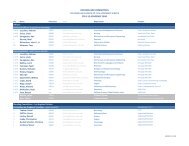
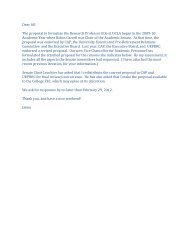
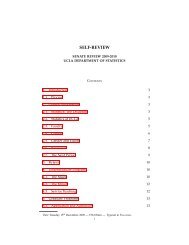


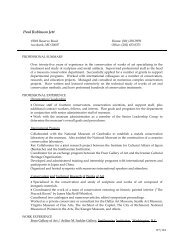


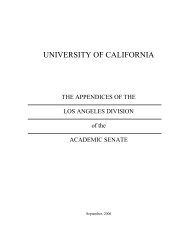
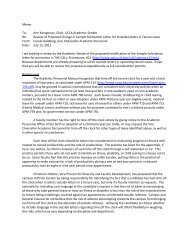
![Schedule[Final] Summer Sessions - UCLA Academic Senate](https://img.yumpu.com/42025221/1/190x245/schedulefinal-summer-sessions-ucla-academic-senate.jpg?quality=85)
